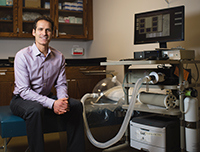Shedding fat and toxins

Arciero tracks blood chemistry, oxidative
stress, and other health markers in his
diet studies.
Paul Arciero, a Skidmore professor of heath and exercise sciences, recently shared his work on a diet that reduceds body weight while promoting a safe release of stored toxins. The paper is in the International Journal of Environmental Research and Public Health. Skidmore students, health services staff, and other campus colleagues assisted with his research, which also led to papers in the July 30 edition of Nutrients journal and the August 29 Frontiers of Physiology.
Arciero’s study focused on a protein-pacing caloric-restriction diet, which features four to six meals, each with 20–25 grams of protein, each day. In a 12-week study of this P-CR diet, women consumed 1,200 calories per day, and men 1,500; for both, 30% of their calories came from lean protein, 45% from unrefined carbohydrates, and 25% from healthy fats. One day a week, dieters engaged in a cleanse, consuming just 300–450 calories from antioxidant-rich plant foods. The dieters on average lost 10% of their body weight, had a 25% increase in toxic PCBs released into their bloodstream but also a 25% reduction in oxidative stress, and showed 12% less blood-vessel stiffness.
Next, a full-year phase of research compared a 1,900-calorie P-CR diet and a 1,900-calorie “heart-healthy” diet. The P-CR group cleansed either once every two weeks or once a month and consumed the previous percentages of protein, carbs, and fat. The other group followed a lower-protein, higher-carbohydrate protocol (35% fat calories and 50–60% carbohydrate calories) that included 20–30 grams of fiber and fewer than 200 milligrams of dietary cholesterol per day. After a year, blood tests and other studies showed that the P-CR diet performed better. The heart-healthiers had regained an average of 12 pounds of their earlier weight loss, most of it in fat, whereas the P-CR dieters regained only 1.5 pounds and continued to eliminate stored PCBs.
In fact, Arciero’s findings may help allay concerns that the release of toxins into the bloodstream during weight loss could cause oxidative stress and raise the risk of developing endocrine disruptions, heart disease, cancer, Parkinson’s, and other illnesses. In his research, he explains, when PCBs moved from the fat into the blood of a P-CR dieter, “the body compensated by releasing more antioxidants. It came to its own defense, scavenging and squelching the toxins.” Thanks to this cleanup of flushed toxins, he concludes,“we had a healthy weight-loss intervention.”


